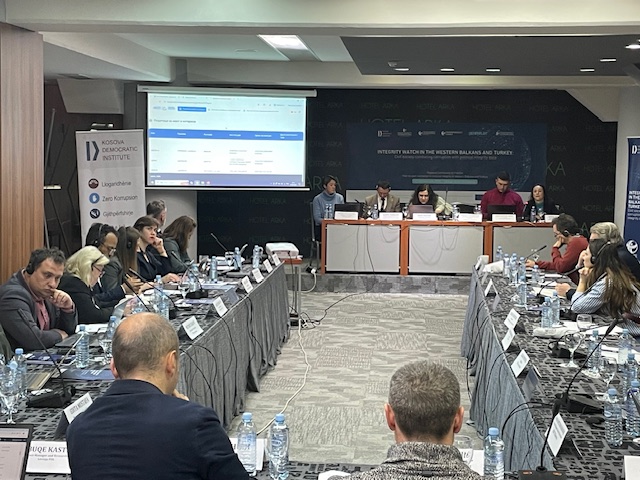Within the framework of the project: “Integrity Watch in the Western Balkans and Turkey: Civil society combating corruption with political integrity data” was held a meeting between the members of the Regional Community of Practices (RCP) in Skopje discussing political integrity and the importance of open data in the fight against corruption in the Western Balkan states and Turkey. The meeting was held on 27th and 28th February 2025. The discussions between professionals from institutions, civil society and academia were divided in three interesting panels covering:
- Declaration of wealth
- Political finance
- Contracts or public procurement
PANEL 1: Is the Declaration of Wealth helping to detect corruption or is it just a “paper tiger”?
Apart from proper regulation of the issue of declaration of wealth and interest, the major problems which are common to most states in the region are related to ineffective enforcement of law especially in verification of property declared by public officials, and lack of institutional capacity to do so verified wealth, low fines for non-declaration and non-friendly formats in which wealth is declared. The panel was moderated by Marija Sunchevska from Transparency International- Macedonia. On the panel discussed Agron Behrami from APK, Kosovo; Melisa Fazlibegović from CEC, Bosnia and Herzegovina; Irena Popovska from State Commission for the Prevention of Corruption, Macedonia; Aleksandar Djekic from Bečej Youth Association, Serbia and Ekin Bayur from TI Türkiye.
PANEL 2: Unlocking the power of political finance data: can it transform the regional political integrity
From states that have solid regulation of the issue of political financing to those that do not apply limits at all on campaign expenses; from practices where it is not known which businesses donate to parties to practices where parties do not receive funds from businesses because they receive from the state – How can we legally regulate online campaigns and how can we ensure that campaigns are competitive and equal for all parties? What would happen to transparency in campaign financing if NGOs did not monitor and expose party expenses? As campaigns in the region are becoming more and more expensive, how can we ensure that funding is transparent? The panel was moderated by Eugen Cakolli from KDI Kosovo, accompanied by the speakers: Željko Bakalar from CEC, Bosnia and Herzegovina; Diana Metushi from KDI Kosova; Zoran Shapurikj, Professor from the American University, Macedonia; Milos Djordjevic from Transparency International Serbia and Dilek Yilmanzcan – Professor, Maltepe University, Turkey.
PANEL 3: How to prevent political undue influence in public contracting?
Despite digitialized public procurements in the region, the lack of accountability, transparency and conflict of interest continue to undermine the efficiency in public spending. Regional practices show that governments are increasingly misusing the legal provisions dedicated to emergency procurements to buy standard products and services, while expectations are that the media and civil society are the ones who should expose irregularities and misuse of public resources. The discussions are focused on how to challenge the mindset of the regional governments which often display clientelistic premises. Contracts for capital projects such as highways often bypass public procurement procedures, while legal loopholes are exploited in the interests of powerful groups because there are often no reprisals for wrongdoers.
Should integrity in public procurement start from the selection of those who work in public administration to prevent political influence? While the elections are still in the interest of the political forces in the region, why is it important to continue exposing the misuse of public money? The panel was moderated by Milos Dordjevic from TI Serbia. The speakers were: Agon Ibishi from KRPP, Kosova; Dženeta Karabegović, Researcher and Lecturer at the University of Salzburg/Board Member of IT- Bosnia and Herzegovina; Murat Koyuncu, Associate Professor at Boğaziçi University, Turkey; Aleksandra Madjevska Sarakjincheva, Ministry of Finance, Macedonia and Ivan Grujić, Independent IT/Open Data Expert, Serbia.
On the second day was discussed about the preparations for the launch of Integrity Watch digital platforms in Kosovo, Bosnia and Herzegovina, Macedonia, Serbia and Turkey. Among the questions disused were: how will these platforms help us detect corruption risks in wealth declaration, political financing and public contracts; what should be done in order to have data that are standardized and communicated among the participating countries to detect corruption risks within the states but also outside them and what can we learn from the experience of the Integrity Watch Platform in 15 European countries.








